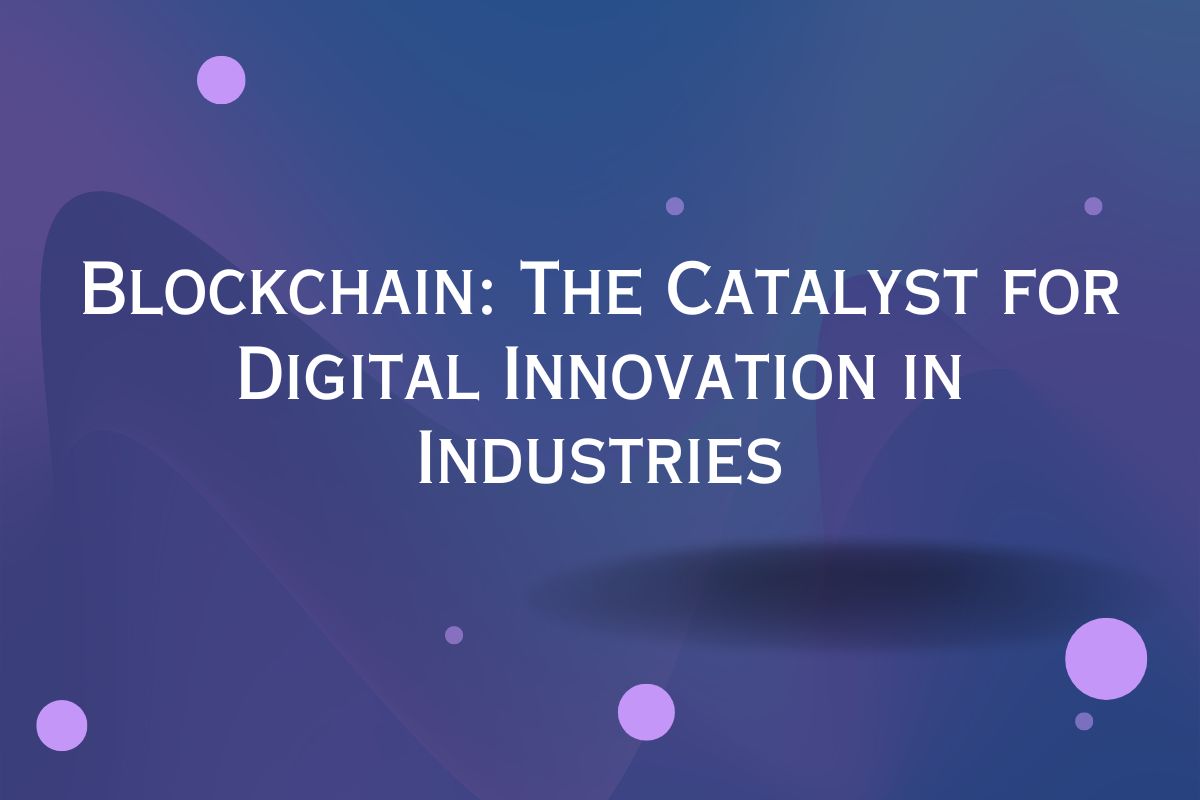Blockchain: The Catalyst for Digital Innovation in Industries

Blockchain technology is a digital innovation that has the potential to revolutionize industries across the board. At its core, blockchain is a distributed ledger technology that allows for secure, transparent, and decentralized record-keeping. By removing intermediaries and enabling peer-to-peer transactions, blockchain has the potential to significantly reduce costs, increase efficiency, and enhance security and privacy.
The concept of blockchain was first introduced in 2008 by an anonymous individual or group known as Satoshi Nakamoto in a whitepaper titled “Bitcoin: A Peer-to-Peer Electronic Cash System.” The whitepaper proposed a decentralized, digital currency called Bitcoin that was based on a new technology called blockchain. Since then, blockchain technology has been applied to a wide range of use cases beyond just cryptocurrency, including supply chain management, digital identity, and smart contracts.
In today’s digital age, where data is king and security breaches are becoming increasingly common, blockchain technology has become increasingly important. By providing a secure and decentralized platform for transactions and record-keeping, blockchain has the potential to transform the way businesses operate and interact with each other. In the following sections, we’ll explore the industries that are already being disrupted by blockchain, the advantages and challenges of blockchain technology, and the future of blockchain innovation.
Blockchain and Industries
Blockchain technology has the potential to revolutionize many industries by providing greater security, transparency, and efficiency in transactions. Here are some of the industries that are already being disrupted by blockchain technology:
Finance: Blockchain is being used to create secure, decentralized payment systems that eliminate the need for intermediaries like banks. This can result in faster, cheaper, and more secure transactions, as well as greater financial inclusion for individuals and businesses without access to traditional banking services.
Healthcare: Blockchain is being used to create secure, decentralized systems for storing and sharing medical records, as well as tracking the supply chain of pharmaceuticals and medical devices. This can improve patient outcomes, reduce healthcare costs, and prevent fraud and counterfeiting.
Supply Chain: Blockchain is being used to create secure, decentralized systems for tracking the movement of goods from suppliers to consumers. This can improve supply chain efficiency, reduce fraud and counterfeiting, and increase transparency and accountability.
Real Estate: Blockchain is being used to create secure, decentralized systems for recording and transferring property titles and other real estate transactions. This can streamline the process of buying and selling real estate, reduce fraud, and increase transparency and efficiency.
Energy: Blockchain is being used to create secure, decentralized systems for tracking energy production and consumption, as well as managing energy grids and billing. This can improve energy efficiency, reduce costs, and increase transparency and accountability.
Gaming: Blockchain is being used to create secure, decentralized systems for managing in-game assets and transactions, as well as enabling peer-to-peer gaming experiences. This can reduce fraud and increase transparency and fairness in the gaming industry.
Education: Blockchain is being used to create secure, decentralized systems for storing and verifying educational credentials and achievements. This can streamline the process of verifying credentials for employers and educational institutions, as well as prevent fraud and counterfeiting.
These are just a few examples of industries that are already being disrupted by blockchain technology. In each of these industries, blockchain is being used to create more secure, efficient, and transparent systems for record-keeping and transactions. As technology continues to evolve, even more industries will likely be disrupted and transformed by blockchain in the future.
Advantages of Blockchain

Blockchain technology offers a range of advantages over traditional centralized systems, including:
Improved security and privacy: Blockchain’s decentralized architecture means that there is no single point of failure or vulnerability, making it more secure and resistant to hacking and fraud. Additionally, transactions are recorded in a tamper-proof and transparent manner, ensuring that data is accurate and unalterable.
Greater transparency and accountability: Blockchain provides a transparent and auditable record of transactions, enabling all parties to access and verify the same information. This can help to increase trust and accountability, as well as reduce the risk of errors, fraud, and corruption.
Increased efficiency and speed of transactions: Because blockchain transactions are peer-to-peer and automated, they can be executed more quickly and efficiently than traditional transactions that require multiple intermediaries. This can help to reduce transaction times and costs, as well as improve overall efficiency.
Cost savings and reduced intermediaries: By eliminating the need for intermediaries like banks, brokers, and other third parties, blockchain can significantly reduce transaction costs and fees. This can help to make transactions more accessible and affordable, especially for those in developing countries or without access to traditional banking systems.
These advantages have already been demonstrated in various industries that have implemented blockchain technology. As blockchain continues to evolve and become more widely adopted, even more benefits will likely emerge.
Future of Blockchain
Blockchain technology is still in its early stages, but it has already demonstrated significant potential for disrupting industries and revolutionizing the way we do business. Here are some of the key trends and developments that are shaping the future of blockchain:
Potential for wider adoption and impact on industries: As blockchain technology becomes more widely adopted and integrated into existing systems, its impact on industries is likely to become even more pronounced. It has the potential to transform industries such as finance, healthcare, supply chain, and real estate, among others, by enabling more secure, transparent, and efficient transactions.
Emerging trends and developments in blockchain technology: Several emerging trends and developments in blockchain technology are likely to shape its future. These include the use of blockchain for social good, such as enabling more transparent and accountable charitable giving, as well as the development of more advanced smart contracts and decentralized finance (DeFi) applications.
The role of blockchain in the future of digital innovation: Finally, blockchain technology is likely to play an increasingly important role in the future of digital innovation. As the world becomes more digital and interconnected, blockchain’s decentralized, secure, and transparent architecture offers a compelling alternative to traditional centralized systems. Blockchain has the potential to enable new forms of digital collaboration and innovation, as well as help to address some of the key challenges facing our digital world, such as data privacy and security.
The future of blockchain is bright, with many exciting opportunities and developments on the horizon. As blockchain technology continues to evolve and become more widely adopted, it will likely play an increasingly important role in shaping the future of industries, digital innovation, and society as a whole.
Conclusion
In this article, we’ve explored how blockchain technology is revolutionizing industries and the potential it holds for transforming the economy as a whole. We’ve discussed the definition and brief history of blockchain, as well as its importance in the digital age. We’ve also looked at specific examples of how blockchain is being used in various industries, as well as the advantages and challenges of the technology.
Despite the challenges and limitations, it’s clear that blockchain technology offers many advantages and has the potential to revolutionize industries and transform the way we do business. From improved security and privacy to increased efficiency and speed of transactions, blockchain technology has the potential to make our digital world more secure, transparent, and efficient.
Related articles



